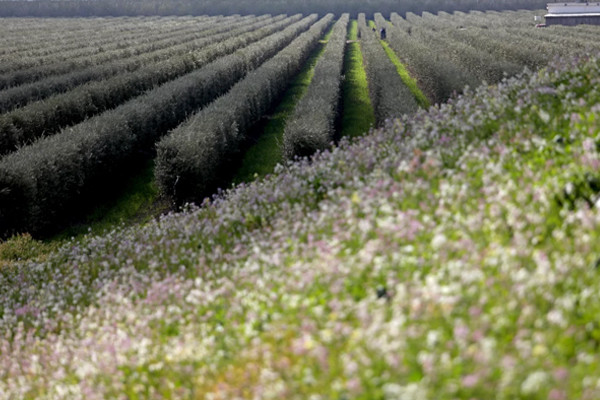✕



✕

Tag:Northern California olive oil Harvard University 2022-04-21 16:40

PETALUMA, Calif. — With its verdant hills full of fruit trees, calming ponds and tastings of an olive oil so precious it is typically drizzled rather than poured, McEvoy Ranch could be mistaken for the Italian countryside.
That’s only fitting. Every tree planted in this 3-decade-old family operation, which helped put California olive oil on the culinary map, can be traced back to Tuscany or Puglia.
The McEvoy family, along with other Northern California olive oil artisans, have imported something else from Europe: the idea that their regional brand is sacred — much like Italians with their Parmigiano-Reggiano or the French with their Champagne. But in this case, the brand is California extra virgin olive oil, a product connoisseurs seek out for its pungency and pepperiness.
A new state law punishes those who improperly use the California name to peddle oil from elsewhere.
“It is extremely important we protect the California brand,” said Samantha Dorsey, president of McEvoy Ranch, where its signature extra virgin oil, milled in-house, sells for around $90 a liter.
The movement that led to the new law triggered one of the biggest food fights in California since Napa vintners got the state to ban charlatans from marketing their wines with the region’s name. It has implications extending far beyond the scenic olive groves of Northern California, drawing into the debate food safety advocates, global marketing consultants, even hedge fund players who see potential for big profits in products labeled as Californian.
The push by the growers for strict rules on what can and cannot be labeled California olive oil “goes with the growing interest of all things gourmet and culinary,” said Larry Olmsted, author of “Real Food, Fake Food,” a book about food fraud. “I think we are going to see more of this around the country.”
Food industry players worldwide have closely watched California’s dispute between boutique operations and the nation’s olive oil giant, Chico-based California Olive Ranch. Backed by tens of millions of dollars from equity firms and institutional investors, California Olive Ranch has industrialized olive oil making in the state, replacing handpicking with machines and supplanting the traditional olive grove with a method called super-high-density planting.
Its lower-cost bottles are on the shelves of 30,000 big-box stores, supermarkets and other retailers around the country. But the labels on its Global Blend had to be changed with the new state law that mandates the word “California” — even in a brand name — cannot be any bigger on the bottle than the type used to disclose other places where the olives came from.
Fights have raged over the use of place names on food labels for more than a century. In the 1890s, according to Thomas Gremillion, director of the Food Policy Institute at the Consumer Federation of America, the issue driving the labels was often food-borne illness.
“People knew that there were epidemics tied to food from one region or a certain country,” Gremillion said. Later there would be concerns about pesticides and chemicals used in various locations. Patriotism and regional pride, of course, have long played a role.
Such issues still underlie some labeling disputes. But the laborious efforts of artisan producers whose work helps turn a brand into something consumers seek out is increasingly a factor. In the case of California olive oil, it got personal.
California Olive Ranch began selling a blend made with olives from outside California not long after investors seeking lucrative returns, including Harvard University, poured many millions of dollars into the company in 2017.
There were just 900 acres of olive trees in the state dedicated to oil production when California Olive Ranch was formed as a local business in 1998, according to company Chief Executive Michael Fox. It drove the footprint of the industry to more than 15,000 acres in the state, he said. The company and its affiliate farmers now harvest 7 million olive trees in California.
The Chef-Approved Ingredients You Should Be Adding To Your Egg Salad
We Tried 13 Fast Food Burger Buns And This One Was The Worst
Your Frozen Vegetables Deserve A Chicken Broth Bath
Why Your Fridge's Drawers Are Always Sticking (And How To Fix It)
Logan Paul And MrBeast Strike Out Against 'Unhealthy' Lunchables With Copycat, Lunchly
MasterChef Winner Michael Leonard Says These Tips From The Judges Led Him To Victory
About Us Terms of Service Privacy Policy Contact Us
Hotline(+86)17301604571
 Enterprise WeChat
Enterprise WeChat
for Client Service
 EZBuy
EZBuy
WeChat APP
Sinoexpo Digital Platform
Shanghai Sinoexpo Informa Markets International Exhibition Co., Ltd. All rights reserved
沪ICP备05034851号-77
 沪公网安备31010402000543号
沪公网安备31010402000543号